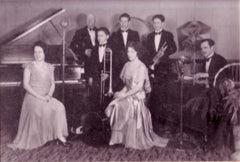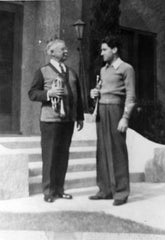Claude Gordon was a musical guru and was widely known as the King of Brass. He was also an author, lecturer, educator, band director, and trumpet virtuoso. Born in Helena, Montana in 1916 to an orchestral director/clarinet soloist father and a concert pianist mother, he also had musically inclined siblings. Together, under their father's direction, they formed a family orchestra that gave numerous performances at a local radio station as their staff orchestra.
Claude started playing professionally while still a teenager, plus he taught accordion and cornet. It was in 1936 that the great Herbert L. Clarke took the young man under his wing and Claude became his protégé for ten years until Clarke passed away in 1945. Claude soon climbed to the top of his field, becoming a successful studio trumpet player with a stellar reputation. A few of the television shows where Claude played in the studio orchestra included "I Love Lucy", as well as "Amos and Andy". He also appeared in several movies, such as the 1939 “Rhumba Land”, and he was at the top of the list of jazz trumpet soloists who were always in demand during the 50’s. In 1959, his newly formed band bore the distinction of being chosen as "Best New Band in America”.

Gordon Band - Left-to right: Nellie Gordon, James Austin Gordon, Jack Gordon, James Franklin Gordon, Ruth Gordon, Claude Gordon, Ivan Jones (announcer).
Later in life, Claude helped design trumpets for Benge, he designed a new trumpet mouthpiece, and taught the methods that he had learned as a young man from his mentor, Herbert L. Clarke. He emphasized physical development for becoming a better trumpet player to his students by using his friendly attitude, that many felt was truly down-to-earth. Many of his most famous teachings involved letting the air do the work, big breaths and keeping the chest up, as well as lifting the fingers high and striking the valves hard.

During his lifetime, musicians would come from far off places just to study with Claude Gordon. Many of them say that they owe their careers to his unique musical teachings. The basic principle of his teaching approach revolved around the theory that all great trumpet players play precisely the same way. He always felt very strongly that proper playing technique goes far beyond any style. He also applied this basic knowledge in a different manner than the majority of the teachers of his time.
Music lessons with Claude were at all times quite specific and included written practice routines that were planned and developed to be performed gradually and always step-by-step, never skipping anything and never becoming chaotic in nature. He prepared a detailed plan for each and every student to ensure that he or she would develop a proper playing technique. He always said that the great Herbert L. Clarke actually taught him how to think, a theory that he passed on to all of his students. He also encouraged his students in the manner of Clarke’s teachings from a century ago to quit the incorrect thinking that all they needed was luck or talent. He said that they should stop following tradition and just use their brains.
At the core of his teachings and his basic philosophy of there being only one correct way of playing were his “Seven Basic Items”, which are characterized as follows:
- Big breath, chest up for wind power
- Understanding the tongue for controlling the velocity of air from the mouth
- Wind control for control over the intensity of developed wind power
- The fingers on the right hand lifting high off of the valves
- A firm grip with the left hand, allowing the right hand to function properly
- Adjusting the facial muscles to keep the lips vibrating
- The lips as a vibrating medium and the proper positioning of the mouthpiece
On May 16, 1996, cancer took the great Claude Gordon’s life. He left behind an incredible legacy of musical history, including his six books, as well as all of the lessons he imparted in his many students. The majority of modern trumpet players were inspired by what is known among musicians as the Claude Gordon method. There is currently a collection at the University of Illinois at Urbana-Champaign in the Sousa Archives and Center for American Music that consists of his correspondence with a number of well-known trumpet artists, including Herbert L. Clarke, plus his performance contracts, musical memorabilia, educational materials, and his music itself.
Claude Gordon will not soon be forgotten. His memory lives on in his music and in the musical performances of his many students and followers of his musical theory.
Links :
- Claude Gordon´s WIki page
- David Roberts blog "The systematic approach"
- Kurt Thompson´s Facebook page "2 Claude Gordon video tutorials"
- Jeff Purtle´s in-depth explanation of Claude Gordon´s 7 basic items